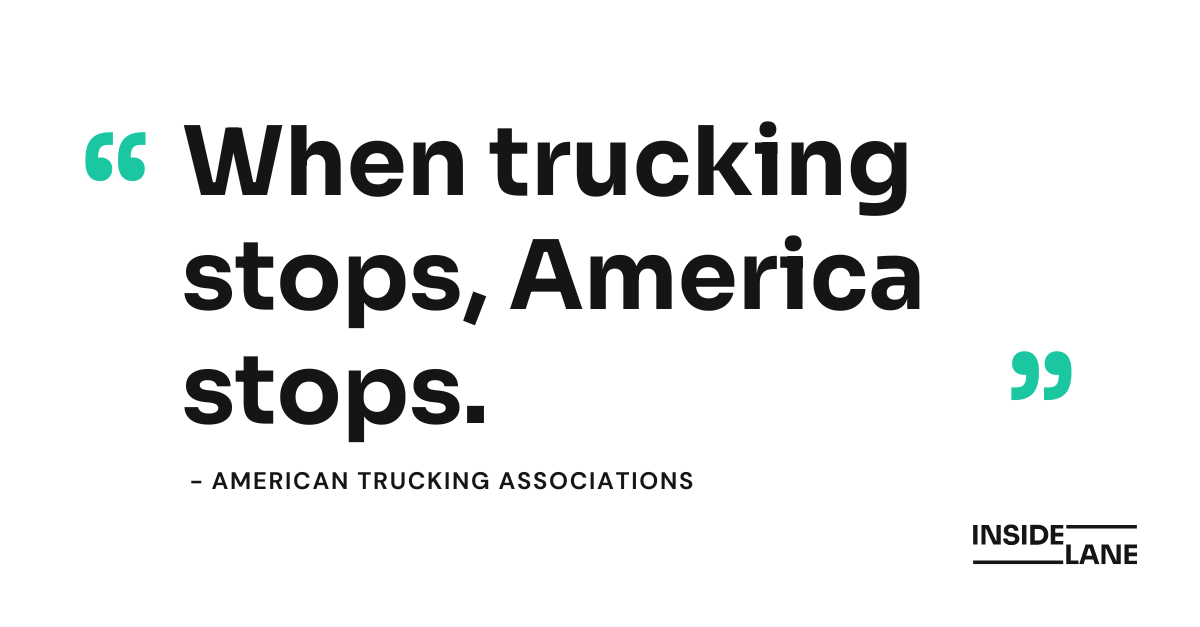Navigating the Health Highway: The Plight of America's Truck Drivers
Exploring the challenges America's truck drivers face in accessing healthcare amidst their critical role in keeping the nation moving, as personal stories and industry efforts unveil a path toward solutions.

By Bianca Prieto | Editor, The Inside Lane
In the trucking world, where the highways stretch endlessly and the deadline clock is always ticking, the health of America’s truck drivers often takes a back seat to the relentless delivery demands.
As the American Trucking Associations succinctly put it, “When trucking stops, America stops.”

In this vital industry, securing accessible healthcare for truck drivers is a daunting obstacle, with the unique demands of their profession leaving little room for medical detours.
Long-haul truck drivers face significant health challenges, exhibiting higher rates of smoking, obesity, and sedentary lifestyles than the general U.S. workforce, as reported by the Centers for Disease Control and Prevention
This lifestyle puts drivers at a greater risk for serious health conditions such as heart disease, diabetes, hypertension, and much shorter life expectancy than in other professions.
While there are efforts to educate and encourage healthy eating, exercise and smoking cessation - the true issue is access to healthcare facilities to diagnose and treat problems as they arise, said long-time truck driver Bob Greiner.
Greiner, a former U.S. Marine who began driving in the 1980s, was forced to retire after suffering an injury at work. He wished he had better access to doctors while on the road, and believes it would have spared him more than one hospital stay.
“A lot of times you can’t get into no hospital,” the Burndridge, Alabama resident told The Inside Lane recently. “You can’t leave the truck loaded and go somewhere. You usually had to drive back to the terminal [while] ill before going to doc or ER.”
Hitting a roadblock: Healthcare Dilemma
The American economy flows on 18 wheels, delivering everything from fresh produce to the latest gadgets at breakneck speed. Yet, drivers behind the wheel face a daunting challenge that goes beyond unpredictable weather and treacherous roads: accessing healthcare.
Spending hours on the road, days on end, when sickness strikes a truck stop convenience store aisle becomes the only place drivers can seek relief.
“They need someplace where a truck driver can have easy access to get taken care of,” Griener said, highlighting the logistical nightmare of seeking medical treatment mid-route.
He said he once had to call 911 for help and was carried out of his semi-truck by paramedics after he suffered gallbladder-related health issues on the road.
Innovative solutions are emerging to bridge the gap between truck drivers and the healthcare they desperately need.
Telehealth services have risen in popularity since the COVID-19 pandemic hit. Anyone with a camera phone and internet connection can call a doctor, but sometimes virtual medical visits aren’t enough and in-person care is required.
At least one healthcare company is working to solve accessibility issues by bringing healthcare to truck stops. InterstateHealth currently operates three clinics at or near truck stops.
“Three more clinics in the works in the middle Tennessee area,” said Michael Detwiler, business development representative for Interstate Health.
The clinics endeavor to serve “everyone who lives and works along our nation’s interstate system and serves rural and other communities with limited options for healthcare,” according to its website.
Navigating a healthier path
Commercial drivers are required by the Federal Motor Carrier Safety Administration (FMCSA) to pass a Department of Transportation (DOT) physical to be sure they are medically qualified to safety operate a commercial vehicle.
Drivers must pass multiple tests, including vision and hearing, blood pressure, and overall physical condition. They must also be examined for any neurological conditions or drug and alcohol use. The medical certificate is valid for up to 24 months, but it can be issued for a shorter time if the driver has certain health conditions that require monitoring.
Interstate Health can perform DOT physicals for drivers as well as treat them for any urgent care needs - like colds, injuries or other issues that require medical treatment.
When access to health care is limited, conditions can quickly deteriorate - and worst case scenario, a driver can die.
The Hard Road to Recovery

Griener spent decades navigating the country’s highways, getting to know the American interstate system like most people know their local roads.
His career came to a screeching halt in 2018 following a series of injuries, the final blow delivered by a treacherous kingpin and an unforgiving glove.
Throughout his career, Greiner encountered numerous obstacles in accessing healthcare.
He describes several instances where he couldn't seek immediate medical attention for injuries and health issues, including a trailer door accident that resulted in a severe arm injury and surgery for a staph infection, a dangerous brown recluse spider bite, sinus cellulitis, and a misdiagnosis that nearly cost him his life.
"We are so limited with a big truck to get in anywhere,” he said. “The only time I could get a prescription, I had to go to Walmart to get it filled. But 90% of us will wait until we get back home. You don't want to be two thousand miles from home and have your family worrying about you."
Greiner's experiences highlight the broader issue of healthcare accessibility for truck drivers, who often must choose between their health and their jobs due to company policies and the logistical difficulties of receiving care while on the road.
His saga isn't just a series of unfortunate events; it's a glaring spotlight on the healthcare hurdles faced by truck drivers.
The Long Haul to Wellness
As America's truck drivers continue to deliver the goods that fuel our daily lives, their battle for accessible healthcare remains an uphill climb.
It's a stark reminder that in the race to keep the wheels of commerce turning, the health of the men and women at the wheel cannot be left in the rearview mirror.
For drivers like Greiner, the road to recovery is more than a personal journey—it's a call to action for an industry in dire need of reform.
Have a question or comment about this article? Email Bianca Prieto at editor@theinsidelane.co
Not yet a subscriber? Join here.





Comments ()